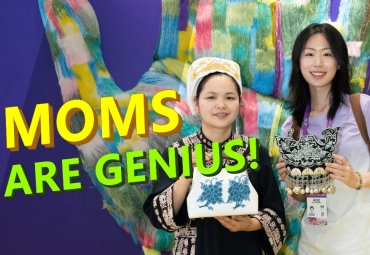City accelerates smart transportation, making drivers happy

A smart, vertical parking lot in Guiyang, Guizhou province helps drivers park their vehicles automatically, saving space and improving efficiency. [PHOTO/CHINA DAILY]
Drivers are feeling more cheerful on the roads of Guiyang, Guizhou province, as the city offers conveniences through its clever transportation application of big data and other high technologies.
While driving on some roads during off-peak hours, traffic lights can be adjusted based on real-time traffic flow through radar and video-sensing equipment, to reduce delays and improve travel efficiency, according to the city's public security transportation management bureau.
Similar conveniences can also be felt when drivers park their cars in the city. At some smart parking lots, a driver only needs to park the vehicle at an induction line so the system can automatically put it into a specific area. When the driver wants to fetch the car, he or she makes a request on the intelligent terminal device and the car will be moved out of the parking spot automatically. The entire process takes about one minute.
"Compared with traditional parking lots, it (the smart lot) reduces the time drivers take to search for an available spot and avoids waiting in long lines during peak hours or possible collisions with other vehicles," said Ai Ying, deputy general manager of the Wisdom of Guizhou Industrial Investment Co Ltd.
She added that parking lots use multiple advanced technologies, such as indoor navigation and vehicle license plate recognition, to realize unmanned management. A 24-hour video surveillance system ensures vehicles' safety.
"The resources of parking lots are not balanced in the city. There is not sufficient supply around some hospitals, schools, trade markets or communities in old towns. Drivers may not know the conditions before they arrive there," Ai said, adding that the company has built eight smart parking lots to make full use of space.
One of the parking lots used to accommodate about 200 cars. After renovating it into a vertical, intelligent one, it can hold 662 cars with six floors above ground and three floors underground.
Through its mini-program, drivers can check the locations of the parking lots and how many parking spots are left in advance, as well as see entertainment information nearby.
For those who don't drive, the city's newly opened mini-program collects information about buses, subways, taxis and rented electric scooters in real-time, which has served residents more than 80,000 times from January to May.
They can also choose to pay by scanning their faces on some subway lines, and in buses.
"Intelligent transportation aims to use modern information technology, such as big data and artificial intelligence, to combine transport with new infrastructure, to offer flexible, green and personalized services for residents," said Su Junjie, who is in charge of the urban traffic department of the Guiyang Transportation Committee.
"It expects to greatly improve experiences, reduce travel costs and increase the commuting efficiency of the city," he said.
As an important part of constructing a smart city, Guiyang has pushed to build an intelligent traffic network. To deal with traffic jams, the public security transportation management department set up a traffic situation research and evaluation center last year. Through a smart screen, traffic can be monitored in real-time across the city and if anything abnormal happens, the platform can judge whether it is a traffic accident, routine traffic jam or other events, so it can allocate policemen or adjust traffic lights to deal with the problem, a policeman named Fu Yuxin from the bureau told local media.
The platform can even predict possible traffic jams by analyzing the law of congestion occurrences and trends. Thanks to the platform, a decrease in the traffic congestion index during peak commuting time reached about 17 percent in 2022, data from the bureau showed.
According to a five-year plan (2023-27) on building a strong transportation network, released by the Ministry of Transport and four other departments earlier this year, transportation's strategic scientific and technological strength and basic technological capabilities should be enhanced to accelerate the development of intelligent transportation.
Hu Zhongxiong, Party secretary of Guiyang, said at a work conference in mid-May that intelligent transportation is an important manifestation of digital city governance and all departments should accelerate to merge information technology, such as big data, into traffic management to increase a sense of achievement, happiness and safety of the people.
All rights Reserved. 京ICP备13028878号-8







 Overview
Overview Guiyang
Guiyang Guian New Area
Guian New Area Liupanshui
Liupanshui Anshun
Anshun Qianxinan
Qianxinan Qiandongnan
Qiandongnan Qiannan
Qiannan Zunyi
Zunyi Tongren
Tongren Bijie
Bijie Guizhou commits to culture preservation and rural vitalization
Guizhou commits to culture preservation and rural vitalization Guizhou voice at 2025 national two sessions
Guizhou voice at 2025 national two sessions Meet the 'genius moms' at Shenzhen cultural fair
Meet the 'genius moms' at Shenzhen cultural fair 

